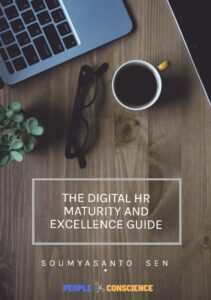Whiny, impatient, hard-to-please, disloyal – these are some of the adjectives associated with millennials at the workplace. This generation born between 1980 and 1996 has also been identified as job hoppers and the hardest to retain. Companies of all kinds are obsessed with understanding millennials better. The Global Human Capital Trends Report, 2016 also stated the rise of millennial workforce as a demographic upheaval, which is a major force of global change in the talent landscape.
The truth is – this particular lot of the population has more or less the same needs as their older generations. In fact, a study by IBM debunked most of the myths associated with millennials. It showed that they actually want the same things from their workplace like their older generations (except for a few differences in matters such as retirement plans!).

But why are they still hopping jobs? 21% of millennial workers had left their jobs in the last year to do something else. Gallup has found that millennials struggle to find good jobs that engage them. In fact, millennials are the generation with the highest rates of unemployment and underemployment in the US. The problem of engagement is even severe with only 29% of employed millennials being engaged at work.

The only explanation to this is that they are clearly not getting what they want. It’s not that the millennials have a completely different view of the world as compared to the older generations, or are asking for too much. With the digital wave setting in and technology being readily available to this generation, organizations need to understand what exactly is expected out of them.
This is extremely critical as the presence of millennials in the US is huge. They are going to make up 40% of the workforce by 2020 and 75% by 2025 (as per the U.S. Bureau of Statistics project). If such a major part of a generation is not engaged at work, the cost of it will also be huge! As per Gallup, millennial turnover costs the U.S, economy $30.5 billion annually. At the same time, 60% of millennials are open to new job opportunities – this basically means that for businesses, half of their millennial workforce doesn’t see a future with them.
As per Gallup, the following things set millennials apart from other generations:
- They really care about their job roles and view them as stepping stones and growth opportunities to their larger goals. 52% of millennials cite career progression as their first priority, followed by competitive salaries (PwC).
- They are deeply committed to what they do professionally.
- They do not want to work for bosses, but for coaches who invest and contribute to their personal and professional development.
- They want more than free beers and a fun workplace as opposed to Baby Boomers and GenXers – they need to be convinced why and how an organization will help them learn, grow and develop and further their careers.
- They want an emotional and behavioral connection with their jobs.
- They want a high level of well-being – be able to spend on things that they want, rather on things they should have. Work life balance is key for them and they aren’t getting it. As per a PwC research 28% of millennial respondents said that their work life balance was worse than they expected before joining.
What Millennials Want from Performance Management
Performance management is a very critical area for most companies to crack as it defines the relationship between a manager and an employee. Millennials want coaches over bosses, and they can only stick to an organization that gives them managers who would potentially invest and contribute to their personal and professional growth. Like any relationship to succeed, communication is crucial here as well. Millennials are hungry for frequent and consistent communication and feedback from their managers. Level of manager involvement is directly proportional to the level of engagement that a millennial employee might have:

Lack of feedback – The reason for disengagement in this regard is also clear with statistics, as only 21% of millennials meet their managers on a weekly basis (Gallup). The exchange of feedback is low. Regular meetings, along with frequent feedback can lead to more engagement and better performance for teams as well as companies as a whole. Performance management needs to be a process spread over a year, rather than a year end discussion which focuses on assigning a number, which clearly is not holistic in nature.
Lack of flexible options – Along with feedback, millennials also wants flexibility at their workplace and move beyond the 9 to 5 cycle of drudgery. 77% of millennials say that flexible work hours are key to boosting productivity (Gallup). They love the idea of being able to work from any location with technology easily available – 39% of millennials believe that more options to work remotely would result in higher productivity.
Leadership and Millennials
89% of organizations cite leadership as one of their top challenges.
~ Global Human Capital Trends Report , 2016
Millennials bring high expectations to a workplace and they look for a recipe that gives them a rewarding, purposeful work experience, combined with constant learning and development opportunities that steers their career progression. Leaders and people managers are the most important stakeholders for driving engagement. HR managers should support leaders in creating an engaged environment at workplace. Leaders who motivate and coach their subordinates, who in turn motivate and engage theirs, are a key ingredient in creating a culture of engagement that sustains business results in a highly dynamic global environment. HR managers should demonstrate investment in helping leaders focus on building skills, empowering their colleagues as well as motivate individuals to ensure that they drive their own engagement.
In the Deloitte Millennial Survey 2016, 39 % of millennial respondents pointed to leadership as one of the most sought after aspects at the workplace. They also believe that businesses are not doing enough to bridge the gap and ensure that a new generation of business leaders is created. The survey also revealed that 71% of those millennials who are likely to leave their current company in the next two years are unhappy with how their leadership skills are being developed.
As per the Global Human Capital Trends report 2016, only 7% of surveyed respondents reported to have accelerated leadership programs for millennials. 28% of respondents reported weak or very weak leadership pipelines. And 21% of companies have no leadership programs at all! Many organizations are still finding it difficult to identify potential leaders and develop them, despite heavy investment being done to achieve the same.
On-the-job Training Opportunities
30% of executives see learning as the primary driver of employee development in the Global Human Capital Trends Report, 2016. Professional growth within the company is possible through learning and customized and blended training programs – which is something the young workforce is desperately looking for. Millennials have reported that they will move elsewhere if employers fail to provide learning opportunities to them. What needs to be done here is that employees need to be viewed as customers who long for satisfaction, rather than being treated as students who are pressurized into traditional classroom methodologies. This is the generation who loves exploiting the power of technology and mobile devices, and if learning programs are not aligned with these wants, they are most likely to leave that organization.
Millennials and other young employees have grown in a self-directed learning environment and have been exposed to the internet from an early stage. In fact, 85% of millennials access internet from their phones. They get most of the information they need from their mobile devices and 93% of millennials use social media to connect with their friends and family, as opposed to 84% in older generations. This is why they expect access to dynamic learning opportunities that fit their individual needs and schedules, as well as suit their talent and interests.
The digital wave has hit the world and the millennials want to take advantage of it. They want to be able to be on the move and work remotely. In fact, as per a study by PWC, 41% of millennials prefer to communicate electronically at work than face to face or even over telephone.
What Organizations Need to Do
- Help millennials grow: Only 28 percent of millennials feel that their current organizations are making ‘full use’ of the skills they currently have to offer (Deloitte Millennial Survey, 2016).
Managers need to really understand the personal and professional goals of millennials. Understand the areas that interest these passionate people and offer them opportunities in the same.
- Mentoring: As per the Deloitte Millennial Survey, 2016, among those millennials who have somebody acting as a mentor, 83% are satisfied with this aspect of their working lives.
Millennials want and value frequent feedback unlike annual reviews that dominated in the past. They are more than willing to know how they are doing on a regular basis and expect real time feedback. Organizations need to make continuous feedback a major part of their engagement strategy.
- Encourage learning: Millennials are hungry for knowledge and they want to experience as much as training as possible. Organizations need to focus deeply on this aspect and build and measure the effectiveness of learning programs, along with mentoring programs. Technology plays a key role here as it allows L&D professionals to play with the way they want training to happen, and also retain the interest of this young lot by providing them with innovative learning options. A lot of technological innovations have come up that have helped organizations train their staff as well as measure the effectiveness of their programs. Capabiliti by Qustnis one such product that has helped L&D professionals connect learning with their business goals. See how.
- Focus on culture over profit: Millennials give more importance to people and culture over monetary aspects. Corporate values that are shared with and believed by millennials also promote loyalty—particularly when employers demonstrate a strong sense of company purpose beyond financial success. Those likely to remain longest share their organization’s values, and are more satisfied with its sense of purpose and support of professional development.
- Flexible options: Currently, millennials lack flexible options as 77% wish to have greater mobile connectivity, such as via tablets and smartphones (Deloitte Millennial Survey, 2016). Lack of remote working options is also serving as the greatest gap between current supply and demand surrounds the issue of remote working—fully 75 percent would like to start to, or more frequently, work from home or other locations where they feel more productive. If organizations work around providing such options to millennials, it will definitely increase their levels of satisfaction and boost productivity.
This article has been originally published in The HR Tech Weekly® blog and the Author Bhaswati Bhattacharyya is a Product Specialist at Capabiliti, a mobile-first training and engagement solution for enterprises.


